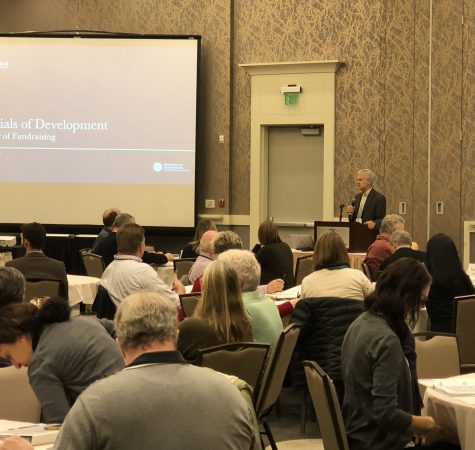At one table sit a group of women who work with survivors of human trafficking. They build partnerships, create resources and execute programs to help bring an end to the practice.
Across the room are a collection of educators who provide after-school programming to help get young women from poor neighborhoods excited about STEM subjects.
Two tables away are supporters of blind athletes who are working to ensure that all individuals have the opportunity to get off the sidelines and enjoy organized competition.
Across the aisle are a group of parents who have suffered the heartbreak of seeing their child diagnosed with cancer and now offer support and resources to other families facing a similar challenge.
Next to that group are neighbors who run a food bank that makes sure local residents in a rural region of the Northwest do not go to bed hungry.
This is just a small selection of the organizations that assembled in a Vancouver conference space last week for the Murdock Trust Essentials of Development Seminar. In the United States, 70% of charitable giving comes from individuals, even though nonprofits tend to invest a considerable amount of their development efforts on pursuing gifts from other sources, such as foundations and corporations. Given the potential giving this population represents, it is critical that nonprofits understand how to engage individual donors to help their organization grow and thrive.
For 26 years, this seminar has provided support and coaching for small-to-mid-sized nonprofits across the Northwest. While the ultimate goal of the training is to help organizations improve their fundraising efforts, Essentials of Development takes a holistic approach to the process, providing attendees with guidance on everything from developing a case statement to board development and engagement to roleplaying how to make the “ask” of major donors.
Participant groups begin their training in December over a two-day session that includes classroom-style seminar sessions and one-on-one guidance from a personal coach. After completing phase one, participants return in about six months for a second session with their colleagues and coaches.
To date, close to 300 nonprofits have successfully completed the training, walking away with a clear message that articulates the value of their organization and a development program designed to sustain and grow their efforts for years to come. For more information on Essentials of Development and how to apply for the next seminar session, please visit our website.
We would like to thank the dozens of nonprofit professionals and board members who joined us for the first portion of this seminar and who will return to work with us in the spring. We are grateful for the work you are doing in your communities and for the opportunity to support you in your mission.








